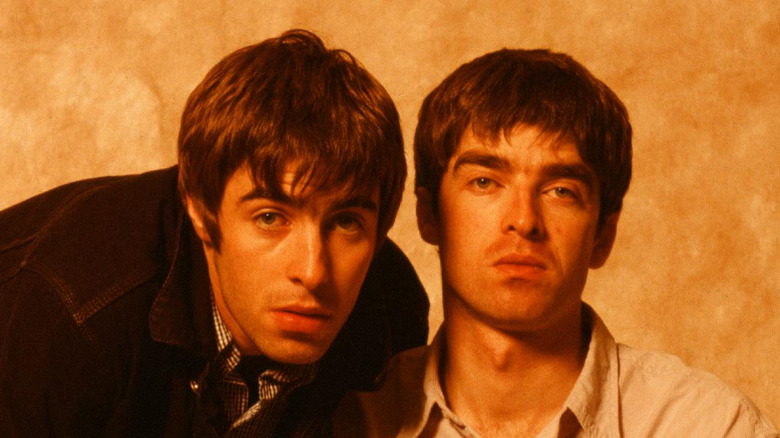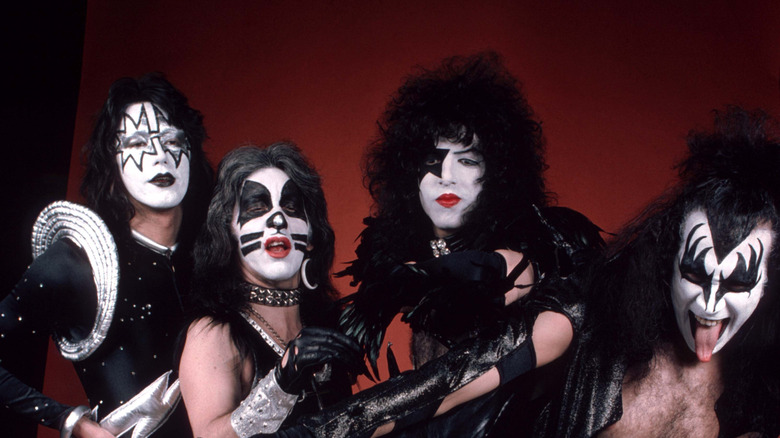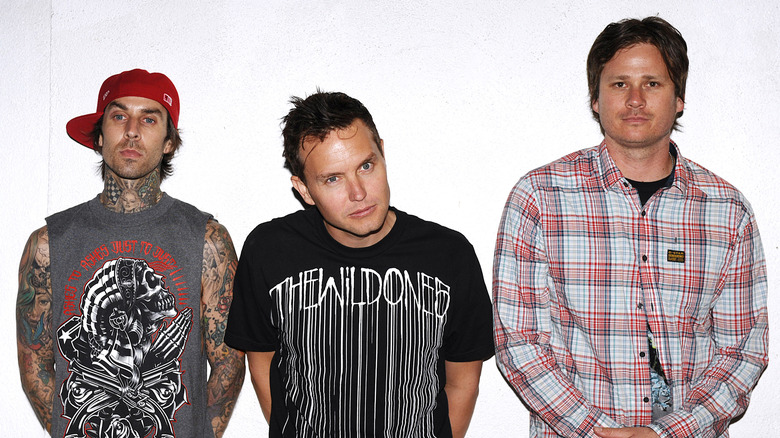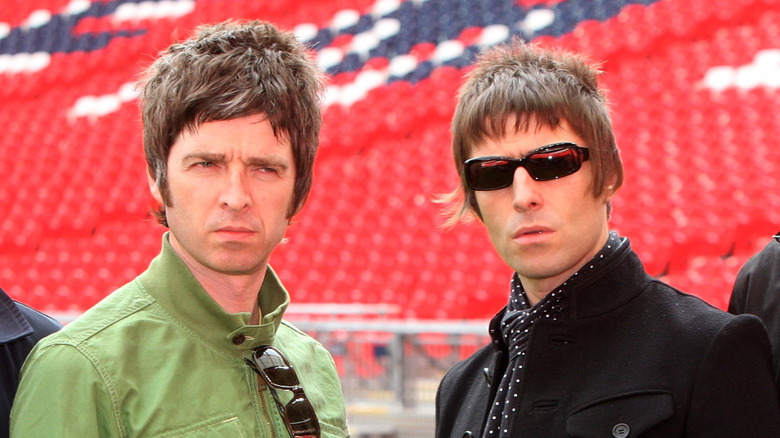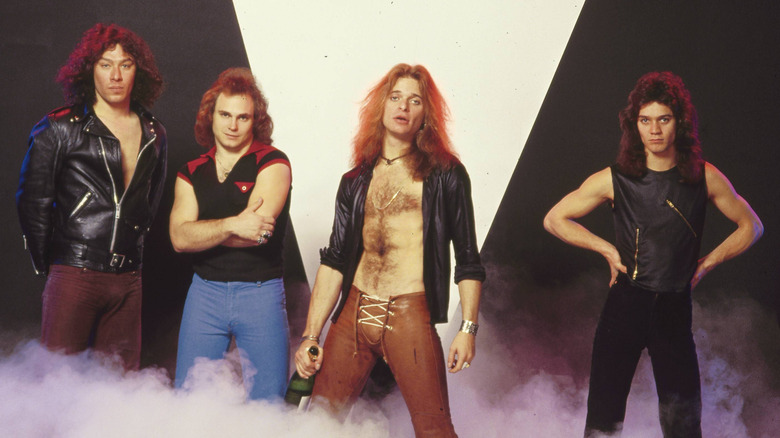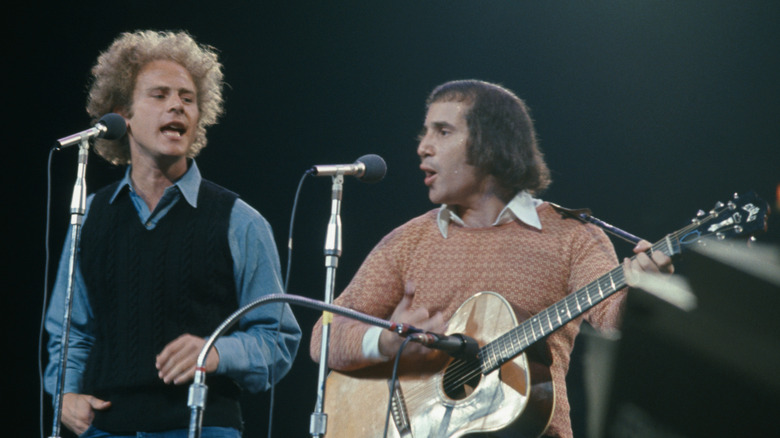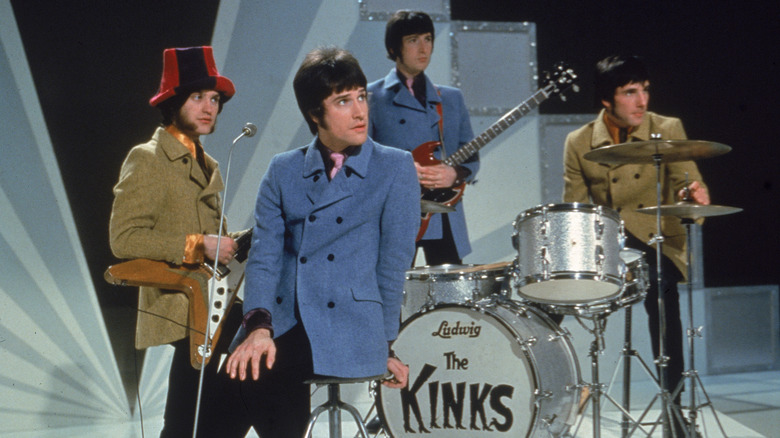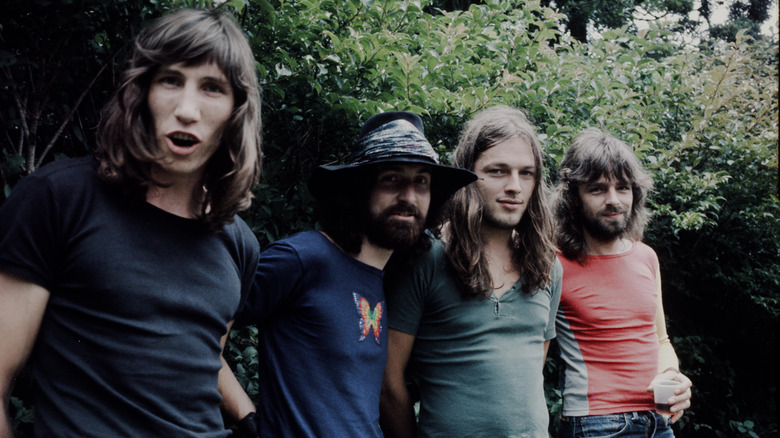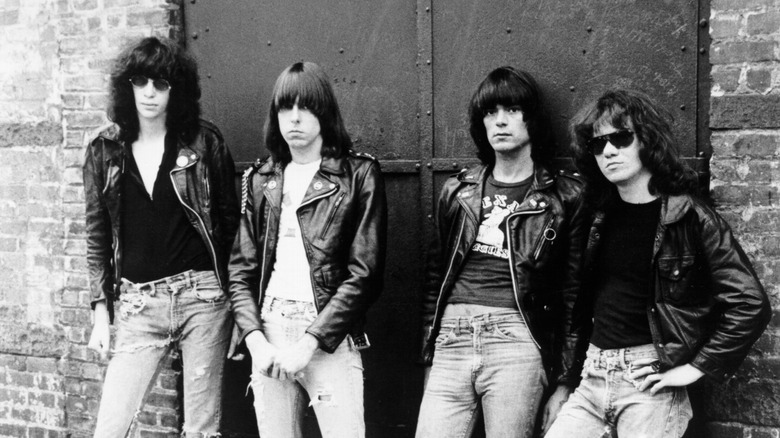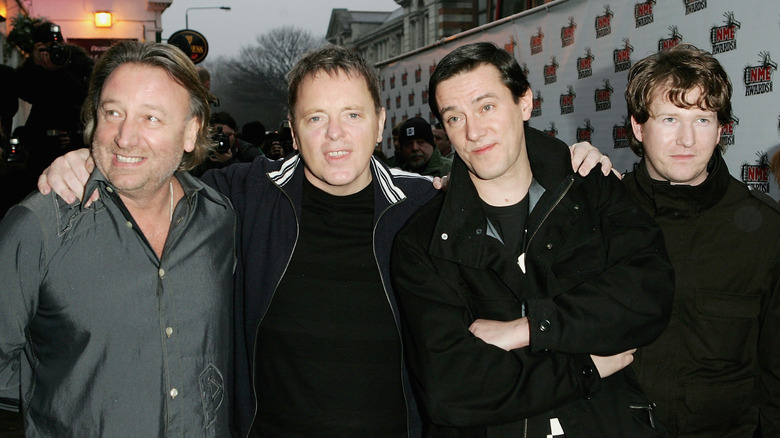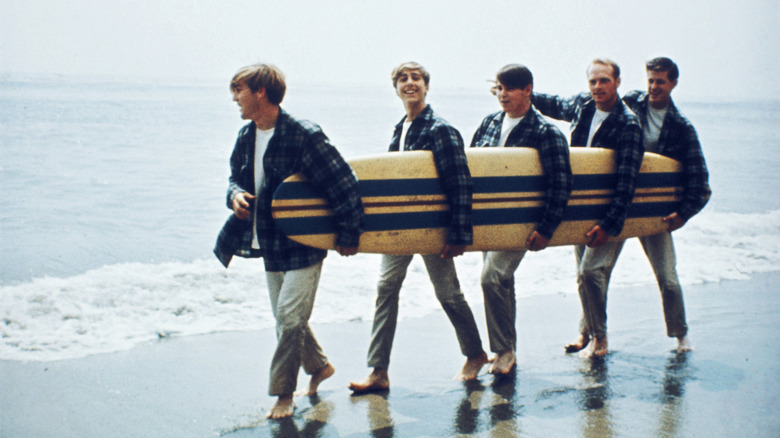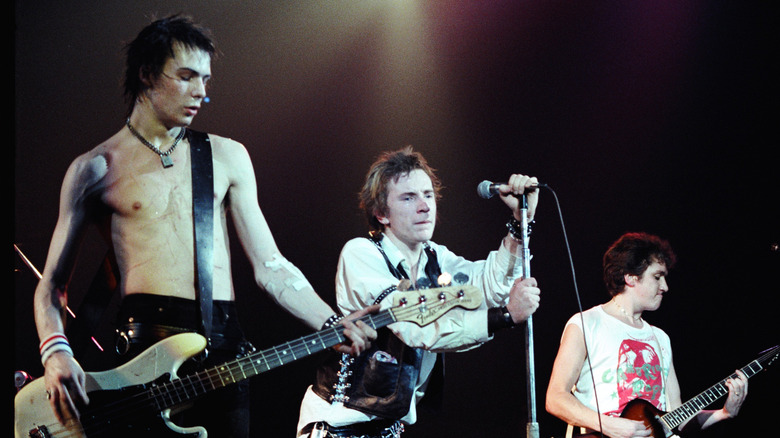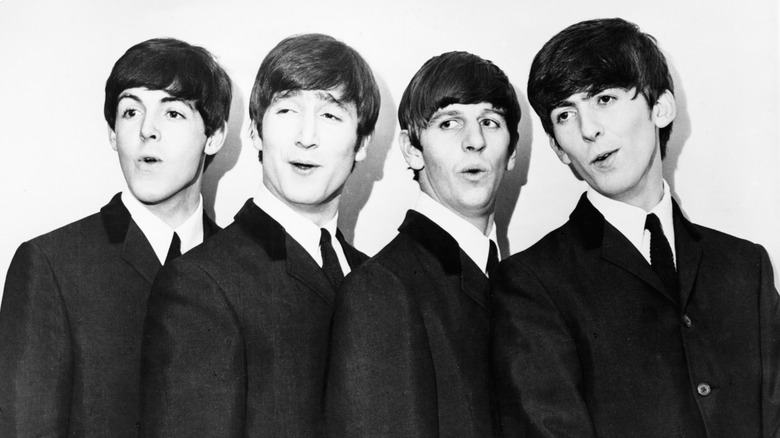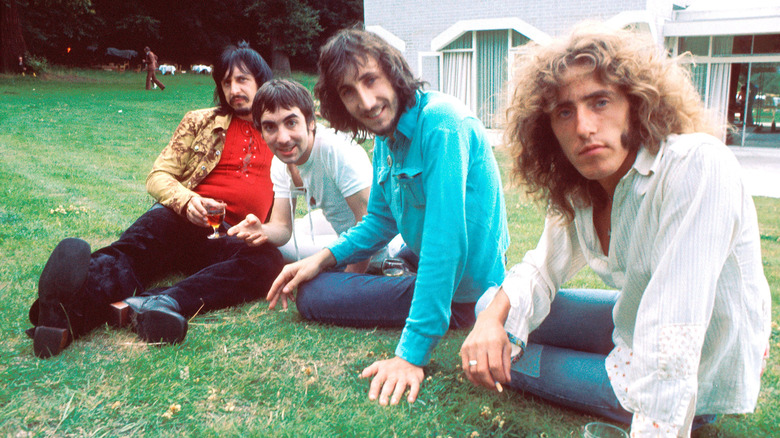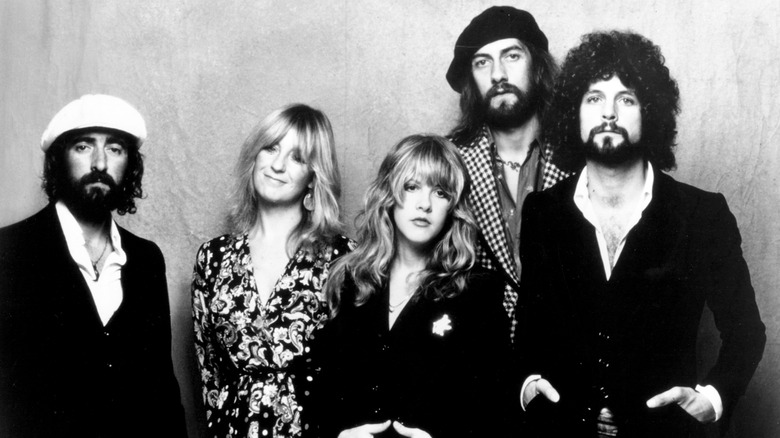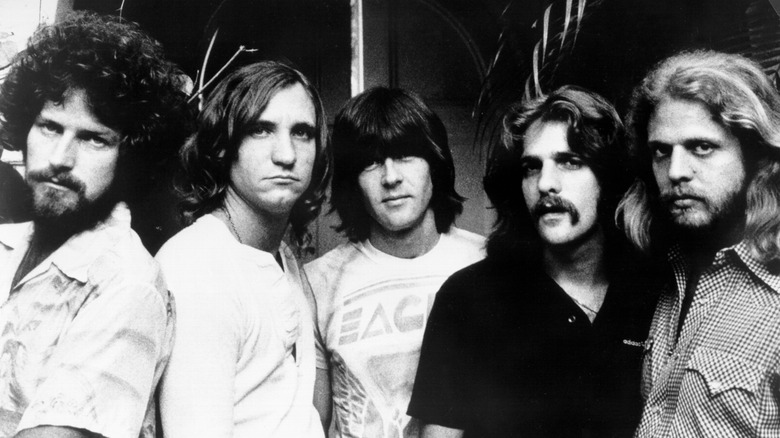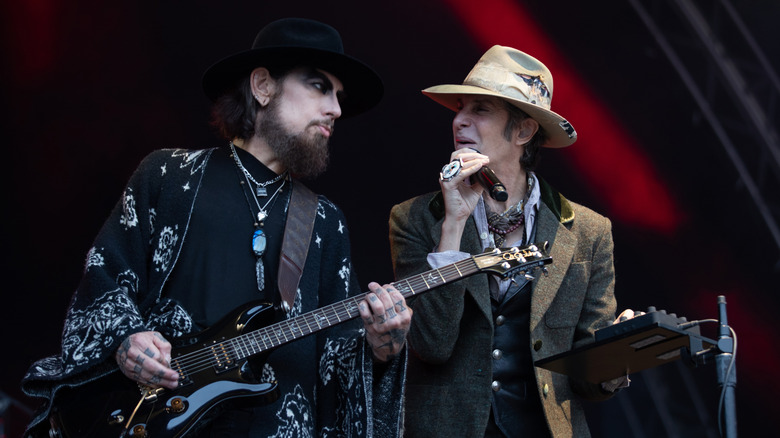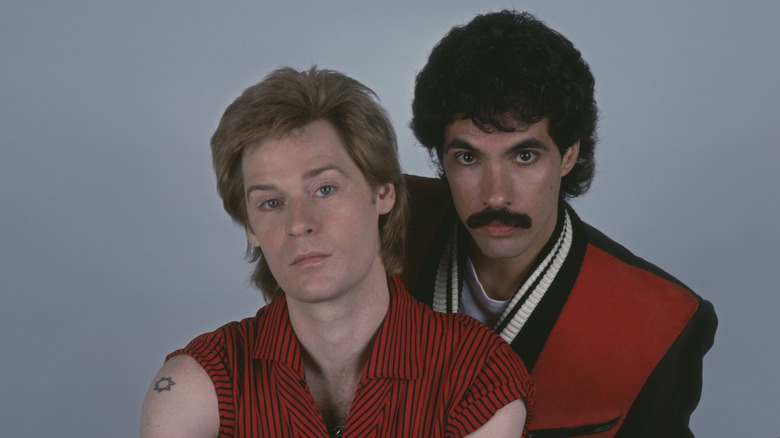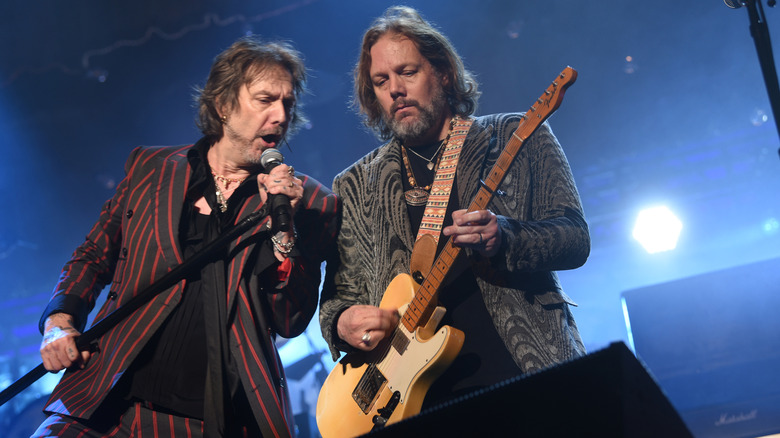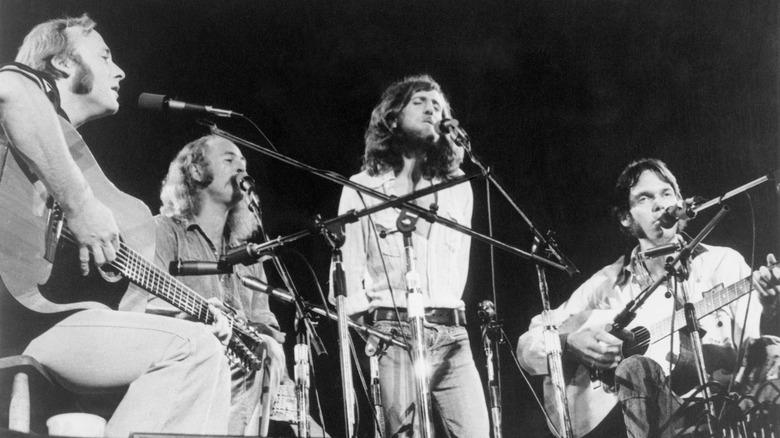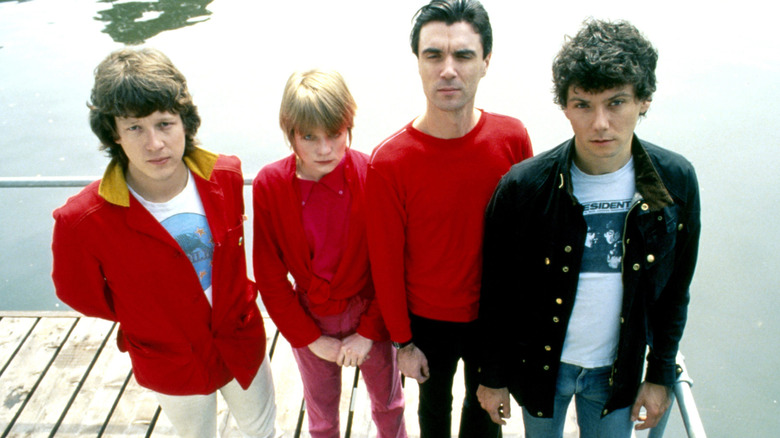Bandmates Who Actually Hated Each Other
It's easy to assume that the members of our most beloved rock bands are lifelong friends, their creative partnerships translating into healthy, well-operating relationships that have endured for decades. That, of course, has been disproven time and time again, as one band after another becomes plunged into chaos due to the dysfunctional interpersonal relationships of their members.
This is hardly a new phenomenon. In the '50s and '60s, despite blending their voices for some of the sweetest harmonies heard in the early days of rock 'n' roll, the Everly Brothers reportedly loathed each other. "We only ever had one argument," Phil Everly famously said of brother Don (via Rolling Stone) in 1970. "It's been lasting for 25 years."
Over the years, bands of all levels of success, from The Beatles on down, have struggled to keep from being torn apart by infighting. This has been at the root of many bands' breakups, although money has often tended to be a key agent of healing when big paydays are dangled, enticing even the fiercest of enemies to put aside their differences for a lucrative reunion tour. That said, even millions of dollars aren't always enough to repair the ruined relationships between embittered musicians and their long-held grudges.
KISS
With their kabuki-style face paint and comic book-inspired costumes, KISS attracted legions of fans with the band's larger-than-life stage spectacles and solid rock hits such as "Strutter" and "Rock and Roll All Nite." The original lineup featured Gene Simmons on bass, singer and guitarist Paul Stanley, lead guitarist Ace Frehley, and drummer Peter Criss. In 1980, Criss was fired when his drug and alcohol misuse affected his musicianship to the point that a session drummer had to be brought in to complete an album. Frehley exited soon after, due to similar issues.
Although both eventually returned for impermanent reunion stints over the years, the bad blood they had with Simmons and Stanley has lingered. When KISS was inducted into the Rock and Roll Hall of Fame in 2014, the band made the rare move of not performing, simply because the estranged bandmates were not able to reconcile with the remaining ones. "When you have a cancer in your system, it's best to cut it out as fast as you can," Simmons told Radio.com (via The Guardian) of why the two would never again be members of the band.
"Ace and Peter have gotten three chances," said Simmons in a 2019 interview with Guitar World. "They were in and out of the band — fired — three times. For drugs, alcohol, bad behavior, being unprofessional ... they weren't carrying their load." Frehley responded with a scorched-earth Facebook post (via Rolling Stone), blasting Simmons and Stanley as "untrustworthy" and "control freaks."
If you or anyone you know needs help with addiction issues, help is available. Visit the Substance Abuse and Mental Health Services Administration website or contact SAMHSA's National Helpline at 1-800-662-HELP (4357).
Blink-182
Blink-182 frontman, guitarist, and co-founder Tom DeLonge experienced a bitter breakup when he quit the band in 2005. He returned to the fold in 2009, but his relationship with his bandmates wound up deteriorating even further. A disastrous attempt to record an EP resulted in his second — and, to date, permanent — exit from the band.
In a lengthy 2015 Facebook post, DeLonge blamed "squabbling and politics" for the EP not being released. "At the end of the day, we've always been dysfunctional, which is why we haven't talked in months," he wrote. When the band issued a statement — without his knowledge — claiming he'd quit, DeLonge saw that as the straw that broke the proverbial camel's back. "I never quit the band," he wrote in a since-deleted Instagram post (via Rolling Stone). He ended his missive by declaring that "our relationship got poisoned" by that statement.
Speaking with Rolling Stone, Blink-182's Travis Barker and Mark Hoppus refuted DeLonge's recollection of events, instead insisting they'd received an email from DeLonge's manager informing them, "Tom's out indefinitely." Barker then proceeded to blast DeLonge, claiming that he and Hoppus had been shouldering the weight on his behalf for years. "It's hard to cover for someone who's disrespectful and ungrateful," Barker sniped.
Oasis
The feud between the sibling co-founders of Oasis — Noel and Liam Gallagher — has become legendary, their relationship characterized by nasty remarks, non-stop sniping, and even a notorious incident in which Noel bashed Liam in the head with a cricket bat. "He's the angriest man you'll ever meet," Noel said of his brother during an interview with Q (via The Standard). "He's like a man with a fork in a world of soup."
Oasis split up when Noel quit shortly before a 2009 performance in France. "People will write and say what they like, but I simply could not go on working with Liam a day longer," he said in a statement, as reported by NBC Chicago. For the next decade-plus, the estranged brothers threw barbs at each other. For example, in a 2019 interview with The Guardian, Noel reviewed one of Liam's recent live performances. "I don't think I've ever been so embarrassed for a man in my entire life," he stated. When asked about the possibility of an Oasis reunion, Noel insisted it would never happen because of his animosity towards his brother. "It boils down to, on a personal level, f*** him," he said.
In August 2024, the brothers announced they'd miraculously settled their differences, and Oasis would reunite for a tour in summer 2025. "You know what it's spiritual but I can't help think about all those wasted years what a waste of PRECIOUS time," Liam tweeted to a fan's query about reuniting with Noel.
Van Halen
Few bands have weathered interpersonal turmoil as successfully as Van Halen. The band skyrocketed to fame in the late 1970s with singer David Lee Roth fronting the group, until he quit the band in 1985 to pursue a solo career. Roth's parting was hardly amicable, with guitarist Eddie Van Halen bidding him good riddance. "Twelve years of my life, putting up with his bulls***," he complained to Rolling Stone, alleging Roth's exit blindsided him. "He left us hanging," Van Halen griped. Roth fired back in a press conference, refuting the guitarist's characterization of events. "Two weeks later I'm reading in Rolling Stone what an a**hole I am, and how poor little Eddie was forced to spend the last 12 years of his life living a lie," he sarcastically said.
Roth's solo career was not as successful as he'd hoped, while the band went on to reach further heights with Roth's replacement, singer and guitarist Sammy Hagar. That second era of Van Halen yielded numerous hit singles until Hagar was fired from the band in 1996, with Roth briefly rejoining Van Halen until that reunion quickly went south. Hagar and Roth then teamed up for a joint 2002 tour, with Hagar returning to Van Halen for a 2004 reunion tour that proved calamitous; as Hagar told Guitar.com, the guitarist "was a complete raving maniac" during the tour.
Hagar exited again, and Roth then returned in 2007. He remained in Van Halen until Eddie Van Halen's sad death in 2020.
Simon & Garfunkel
Among the most popular folk-pop acts of the late 1960s, Simon & Garfunkel racked up an impressive string of hits before their bitter breakup in 1970, right after "Bridge Over Troubled Water" became their biggest-selling album. As Paul Simon explained in an on-camera interview for the docuseries "In Restless Dreams: The Music of Paul Simon," their relationship fundamentally crumbled while making that album, when Art Garfunkel's quest for movie stardom threw a wrench in their partnership.
When Garfunkel revealed his plan — that Simon would work on the music while he shot movies for half the year, and then swoop in to record his vocals — Simon was furious that Garfunkel expected him to carry the lion's share of the partnership. "We were really best friends up until 'Bridge over Troubled Water,'" Simon said (via The Independent). "[Afterwards], it didn't have the harmony of the friendship ... that was broken."
The pair reunited sporadically, and then the massive success of their 1981 reunion concert in Central Park spurred plans for a full-fledged tour. "We were famously antagonistic, but I thought, 'You know what? I am going to put that all aside and have a good reunited tour with Artie,'" Simon said in the doc (as reported in People). However, old wounds were reopened, and their relationship grew so fractious that the tour was scrapped. Interviewed by The Telegraph in 2015, Garfunkel described his former partner as a "jerk" with a Napoleon complex. "I created a monster," he said.
The Kinks
Founded by brothers Ray and Dave Davies, The Kinks were at the forefront of the British Invasion of the mid-1960s, rocking the charts with such hits as "You Really Got Me" and "All Day and All of the Night." Throughout the decades, the relationship between the siblings has been rocky, going all the way back to childhood. "I think Ray has only been happy for three years of his life ... the three before I was born," Dave told The Telegraph.
After decades of public squabbling, the band split up for good in 1996, and the real reasons The Kinks broke up had to do with the ongoing animosity between the Davies brothers. Their relationship was not repaired after the band broke up; in 2010, Dave gave a blistering interview to the Daily Mail, blasting his brother with both barrels. "Ray's an a**hole," he declared. "You've heard of vampires. Well, Ray sucks me dry of ideas, emotions and creativity. It's toxic for me to be with him. He's a control freak."
More than a decade later, their fraught relationship had apparently softened a bit. Ray, then with his 80th birthday around the corner, told The Times in 2024 that they were finally back on speaking terms, even though they lived on different continents. "The band though, it's like family," he mused. "You argue a lot and you fight, but you love each other really."
Pink Floyd
Pink Floyd made history with its 1973 album "Dark Side of the Moon," which spent more than 970 weeks (in excess of 18 years) on Billboard's Top 200 U.S. album chart and eventually sold over 45 million copies. Despite that success, battles between guitarist David Gilmour and bassist/primary songwriter Roger Waters came to a head in the mid-1980s, when Waters had come to the conclusion that Pink Floyd had nothing left in the tank. "I had decided the band had run its course as a creative unit," Waters told Uncut Magazine in 2004, confirming that tensions with Gilmour also contributed to his exit. "Dave and I were always slightly at loggerheads," he added.
Over the years, the war of words between Waters and Gilmour has grown increasingly nasty as it played out publicly via the media. When interviewed for The Guardian in 2024, for example, Gilmour was asked if he'd ever reunite with Waters. "Absolutely not," he declared. "I tend to steer clear of people who actively support genocidal and autocratic dictators like [Russian leader Vladimir] Putin and [Venezuelan president Nicolás] Maduro."
Speaking with Rolling Stone in 2018, Pink Floyd drummer Nick Mason addressed his former bandmates' decades-long feud. "I think it's really disappointing that these rather elderly gentlemen are still at loggerheads," he observed, sharing his belief that Waters felt his contributions to Pink Floyd as a songwriter far outweighed Gilmour's guitar playing. "I think the problem is Roger doesn't really respect David," Mason added.
The Ramones
When it comes to petty, pointless squabbling within a rock band, The Ramones hold a special place in the annals of music history. The original Ramones lineup consisted of singer Joey Ramone (real name: Jeffrey Hyman), guitarist Johnny Ramone (John Cummings), drummer Dee Dee Ramone (Douglas Colvin), and Tommy Ramone (Erdelyi Tamas). Friction between the band members resulted in a revolving door of band members over the years as original members left and were replaced with the likes of C.J. Ramone, Marky Ramone, Richie Ramone, and even Elvis Ramone (who was actually Blondie drummer Clem Burke, who joined the band in 1987 and lasted all of two shows).
Rumor has it that Joey and Johnny disliked each other from the get-go, and their relationship went downhill from there. The rift between the bandmates, however, grew to canyon-size proportions when Johnny married Joey's ex-fiancée. After that, the two remained in the band, but barely spoke to each other. "They came to an agreement where they kind of tolerated each other," the band's manager, Monte Melnick, told the New York Post. "It's like a business. You're working with someone you don't particularly like, [but] you're still working there because you like your job."
New Order
The tragic real-life story of Joy Division came to an end when singer Ian Curtis died by suicide in 1980. The rest of the band continued, albeit with a different name: New Order. The band experienced even greater success until bassist Peter Hook quit the band in 2007, reportedly due to clashes with the rest of the group (particularly fellow Joy Division co-founder Bernard Sumner), and New Order split up. When the group got back together, Hook wasn't invited to return. He subsequently sued his former bandmates, claiming they'd ripped him off and cost him millions. The lawsuit was settled in 2017, but the bad blood remained. "Everything is coloured by the animosity," Hook said in a 2025 interview with The iPaper, revealing it had been 17 years since he last spoke to Sumner.
Reflecting on the band's success when interviewed for Get Into This, Hook said, "Anyone watching it would think. Oh my god look at them, they've got everything. They've got success, they're fêted, what a wonderful world,' and yet really we f***ing hated each other."
For his part, Sumner dismissed Hook as something of a crank. "My heart bleeds for him. He left the band, and then he complained about leaving the band," he told Rolling Stone in 2015. "He's so angry. If you choose to take a path in life, don't blame other people for the path you've chosen to take."
If you or someone you know is struggling or in crisis, help is available. Call or text 988 or chat 988lifeline.org
The Beach Boys
When Beach Boys founder Brian Wilson died at 82, the music world lost a true visionary, whose surfing-themed pop songs captivated teenagers before paving the way for the sonic genius of the classic "Pet Sounds" album. While Wilson's mental health issues over the years have been well documented, so too was Wilson's decades-long feud with bandmate Mike Love.
Perhaps the most notorious incident occurred in 1977, during a performance at Wembley Stadium attended by 15,000 fans. Love became so furious at Wilson that he hurled a piano bench at him; it missed, instead bouncing off the stage and narrowly missing Love's children, who were sitting nearby. Love went on to sue the band repeatedly, even suing Wilson for defamation and winning a huge $1.5 million settlement.
At the end of the day, Love has made peace with his role as the villain in the Beach Boys' story, even though his perspective on what took place between the two was vastly different than Wilson's. "For those who believe Brian walks on water, I'll always be the Antichrist," he wrote in his memoir, "Good Vibrations: My Life as a Beach Boy" (via Rolling Stone).
If you or someone you know needs help with mental health, please contact the Crisis Text Line by texting HOME to 741741, call the National Alliance on Mental Illness helpline at 1-800-950-NAMI (6264), or visit the National Institute of Mental Health website.
The Sex Pistols
In the 1970s, The Sex Pistols took the world by storm with their incendiary punk rock. However, the band self-destructed at the peak of its popularity after a chaotic American tour and the death of bassist Sid Vicious, who overdosed shortly after being charged with murdering girlfriend Nancy Spungeon.
Pistols frontman Johnny Rotten (aka John Lydon) has never been one to suffer fools gladly, and his unvarnished opinions tend to range from candid to scathing. That was certainly the case when the group reunited in 1996 for the aptly titled Filthy Lucre tour. "We still hate each other with a vengeance," he snarked during a press conference, as reported by Rolling Stone. "But we've found a common cause, and that's your money."
When the rest of the band embarked on a tour sans-Lydon nearly two decades later (singer Frank Carter was enlisted as a substitute), Lydon slammed the entire enterprise. "It's just karaoke, really," Lydon declared when appearing on the "Classic Album Review" podcast. Boasting that he wrote all the songs, and sang them ("I am the voice what made the whole world sing," he quipped), Lydon pointed out that the rest of the band members had had decades to write their own songs — but couldn't, and were therefore forced to perform his. "They profess their hatred for me, but they can't live without me," he added. "I am the punishment that goes on giving."
The Beatles
The indelible image of four smiling mop-topped young Liverpudlians was set to rest in 1970 with the bitter breakup of The Beatles. When John Lennon, Paul McCartney, George Harrison, and Ringo Starr went their separate ways, it was ultimately the strained-to-the-breaking-point relationship between Lennon and McCartney that took center stage.
After McCartney released his second solo album, "Ram," John Lennon responded with a bile-spewing single, "How Do You Sleep," with lyrics such as, "The only thing you done was Yesterday." McCartney didn't comment at the time, but later admitted he was stung. "And those things were pretty hurtful," he told GQ in 2020. Lennon also let it fly when he blasted McCartney's ego, which he believed hit its zenith during the making of the "Let It Be" movie. According to Lennon in a 1971 interview with Rolling Stone, "that film was set-up by Paul for Paul. That is one of the main reasons the Beatles ended. I can't speak for George, but I pretty damn well know we got fed up of being side-men for Paul."
Meanwhile, McCartney was simply glad to be done with all the arguing. "Thank God they're not in my life anymore," McCartney said of Lennon and his wife, Yoko Ono, when interviewed for the book, "Paul McCartney: Many Years From Now." "It was all very acrimonious and bitter." However, McCartney revealed to GQ that he and Lennon had buried the hatchet prior to Lennon's tragic 1980 murder, and were on good terms when he died.
The Who
The Who remains one of the most influential British rock bands of the 1960s and '70s, and continued to soldier on as a live act. Despite the deaths of drummer Keith Moon and bassist John Entwistle, and a seemingly endless string of farewell tours (the first taking place way back in 1982), the two surviving original members, singer Roger Daltry and guitarist/songwriter Pete Townshend, have continued to keep The Who alive.
However, that hasn't been easy. Over the years, their battles have become the stuff of rock legend, ranging from nasty comments in the press to the time that Townshend took a swing at Daltry with his guitar, only to have Daltry clock him so hard the singer feared he'd killed him. "I asked for it, but he knocked me out," Townshend confirmed when speaking with the Daily Beast in 2024.
While the anger has cooled down as the years passed, it would be a stretch to characterize the two as friends. "Our relationship is a working one, and that's about as far as it goes," Daltry admitted in a 2022 interview with Forbes. As Townshend later confirmed, he and Daltry were not talking to each other at that time. "We don't speak," Townshend revealed, confessing that if he and Daltry ever were to take to the stage together again, "Roger and I do have a bit of a river to cross."
Fleetwood Mac
Fleetwood Mac was propelled to mega-success with the addition of Lindsey Buckingham and Stevie Nicks. The duo's songwriting and vocals (not to mention Buckingham's fiery fretwork on guitar) took the band to a new level that crystallized in the mega-hit "Rumours" album, selling a staggering 45 million copies and remaining on the U.S. charts for 31 weeks. That album, however, was made during fraught circumstances, in the midst of rising tensions after Buckingham and Nicks ended their romantic relationship while remaining bandmates.
Time is said to heal all wounds, yet the passage of decades only served to worsen relations between the two. "It's no secret, it's no tittle-tattle that there is a brick wall there emotionally," drummer Mick Fleetwood told Mojo of the Buckingham-Nicks relationship in 2024.
It all blew up during a 2018 appearance at the annual MusiCares benefit ahead of the Grammys. "That's when he wasn't very nice to anybody," Nicks recalled in an interview with Rolling Stone. Shortly after, Buckingham was fired from Fleetwood Mac; later, it emerged that his firing came after an either-he-goes-or-I-go ultimatum from Nicks. "I dealt with Lindsey for as long as I could," she said. "You could not say that I did not give him more than 300 million chances." Interviewed by The Irish Times, Buckingham confirmed that he'd rejoin the band in a heartbeat if the invitation came — although that appeared highly unlikely. "At least one person in the band wasn't very receptive to that," he added.
The Eagles
The tragic real-life story of the Eagles seemingly came to an end in 1980, when longstanding friction between Glenn Frey and Don Felder erupted during a 1980 benefit concert for U.S. Senator Allan Cranston. According to Frey, he felt that Felder had acted disrespectfully to the politician, leading to some extremely tense moments during their performance. "We were onstage, and Felder looks back at me and says, 'Only three more songs till I kick your ass, pal.' And I'm saying, 'Great. I can't wait,'" said Frey when interviewed for the book, "The Story of the Eagles: The Long Run." "We're out there singing 'Best of My Love,' but inside both of us are thinking, 'As soon as this is over, I'm gonna kill him.' That was when I knew I had to get out."
That incident sparked the band's breakup, and it took more than a decade before the hatchet was buried and the musicians reunited for an MTV performance, followed by their massively successful "Hell Freezes Over" tour. Yet Felder was still on the outs with the rest of the band, culminating in his 2001 firing. He responded with a series of lawsuits, claiming that Frey and Don Henley were taking a bigger share of the profits for themselves. With Felder seeking $50 million, the case was dismissed when he was paid an undisclosed sum after receiving a settlement offer in 2007.
Jane's Addiction
Since releasing their 1988 debut album, "Nothing's Shocking," Jane's Addiction experienced a roller-coaster ride of highs and lows. It all came crashing down when the band split up in 1991, reportedly amid tensions between group members. Yet that wasn't the end, and the band reunited a few years later for the first, but not the last, time. In fact, subsequent Jane's Addiction reunions were met with varying degrees of success, but always ended the same way: with the band members acrimoniously going their separate ways.
Jane's Addiction reunited yet again in 2024, embarking on a tour that ended with a brawl during a performance, with the whole thing going viral when it was captured on video. After frontman Perry Farrell began throwing punches at Dave Navarro, members of the road crew jumped onstage to intercede; the tour was abruptly cancelled.
In a message Navarro shared on social media, he was hardly coy when pointing the finger at who was to blame for the tour's cancellation. "Due to a continuing pattern of behavior and the mental health difficulties of our singer Perry Farrell, we have come to the conclusion that we have no choice but to discontinue the current U.S. tour," Navarro wrote in a message to fans he posted to Instagram. "Our concern for his personal health and safety as well as our own has left us no alternative. We hope that he will find the help he needs."
Hall & Oates
Going inside Daryl Hall and John Oates' complicated relationship can be like going down the proverbial rabbit hole. While the duo known as Hall & Oates has churned out numerous pop hits, their partnership deteriorated to dust in later years. In 2023, Hall launched legal action to prevent Oates from selling his half of a holding company they co-owned, Whole Oates Enterprises, claiming he did so without his knowledge or consent. Legal documents indicated that in 2022 they began severing their professional ties and dividing assets, which is when Oates began making overtures to sell. That then resulted in Hall taking out a restraining order against his former partner.
Speaking with Billboard, Hall insisted that Hall & Oates had long been a sham, and that touring together was the extent of their partnership. "John and I did not have a creative relationship for decades," Hall said, revealing it was Oates who'd informed him that he wanted out. "I said 'OK,' but the problem is [Oates] didn't make the parting and breakup easy, and that's where the difficulties lay and still lay, and that's all it is."
Oates didn't dispute that, offering a similar view of their fractured relationship when he appeared on "Good Morning America." They rarely spoke, he revealed, but put on a show of unity for fans. "The only thing we did together was play concerts where we just went out there and trotted out the hits," Oates said.
The Black Crowes
While there's certainly plenty that fans don't know about The Black Crowes, one thing that's become common knowledge is the ongoing strife between the band's sibling co-founders, frontman Chris Robinson and guitarist Rich Robinson. "Rich and I are famous for being at each other's throats — and that's very true," Chris admitted in an interview with Esquire (via Guitar.com).
The band broke up in 2015, and to characterize the split as bitter is putting it mildly. In a statement announcing the band's dissolution, Rich accused his brother of demanding that he relinquish his equal share in the band's profits, while also requesting drummer Steve Gorman do the same, and instead be paid a salary. In 2018, Rich slammed his brother when he told Rolling Stone, "He pretends to be this peace-loving hippie that doesn't care about money, while trying to take everyone's money." He doubled down in a radio interview with WBAB (via Stereogum), pouring ice-cold water on the notion of an eventual Black Crowes reunion. "I don't have a brother anymore," he said. "I haven't spoken to him in four years."
The following year, however, the pair surprised everyone when they made a joint appearance on "The Howard Stern Show" to announce the band was reuniting and hitting the road for a tour. Chris shouldered the blame for the breakup, confirming that he'd apologized to his brother for his past behavior. "I said some horrible things," Chris admitted.
Crosby, Stills, Nash & Young
When the massively successful supergroup Crosby, Stills & Nash added Neil Young to the mix, the combination produced beautiful music and endless drama, courtesy of four massive egos and mountains of drugs. David Crosby's addiction issues during the 1980s didn't help matters, yet even after he cleaned up, his shoot-from-the-hip comments created even further divisions within the group. That was certainly the case when Neil Young split from his wife Pegi and began dating actor Daryl Hannah. "And I happen to know that he's hanging out with somebody that's a purely poisonous predator now," Crosby infamously told the Idaho Statesman (via Ultimate Classic Rock).
Realizing he'd scuttled any hope of a CSNY reunion, Crosby attempted damage control when appearing on "The Howard Stern Show." "I screwed up," he said. "I shot my mouth off when I shouldn't have." That admission did not heal the rift, which Young made perfectly clear when he made a subsequent appearance on the same show, obliquely explaining that the situation could have been fixed but hadn't been, and now it was too late.
Graham Nash also had issues with Crosby, who died in 2023 at age 81. Nash blamed Crosby for scuttling one of the most successful groups in music history. "I don't like David Crosby right now," Nash said to the Dutch magazine Lust for Life (via Rolling Stone). "He's been awful for me the last two years, just f***ing awful."
Talking Heads
Led by quirky frontman David Byrne, Talking Heads racked up a string of hits extending from the late 1970s until the early '90s. It all came to a conclusion when Byrne told the Los Angeles Times that the band had broken up. This, however, was news to his bandmates, who learned the news when a fact-checker for the newspaper called them seeking confirmation.
Husband-and-wife bandmates Tina Weymouth (bass) and Chris Frantz (drums) were blindsided, and have since had choice words to share about Byrne over the years. "You know ... he's a very weird guy," Weymouth told Far Out. She also pointed to the hypocritical nature of Byrne's personality, explaining that "he could be a bully, but you couldn't do it to him. He could be unfaithful, but you have to be loyal — it's very Trumpian, in a way ... David never cared about people..." Interviewed by People, Byrne conceded that he had taken a tyrannical approach to the band. "As a younger person, I was not as pleasant to be around," he said, admitting he could have handled the band's breakup better. "It was kind of ugly."
Meanwhile, Frantz has observed that Byrne's public persona had softened over the years, something he believed was less a matter of Byrne's personal growth than it was sheer manipulation. "He's like Mr. Rogers now," Frantz told The Guardian. "It's true that his public image has changed. But friends of mine assure me that he hasn't."
